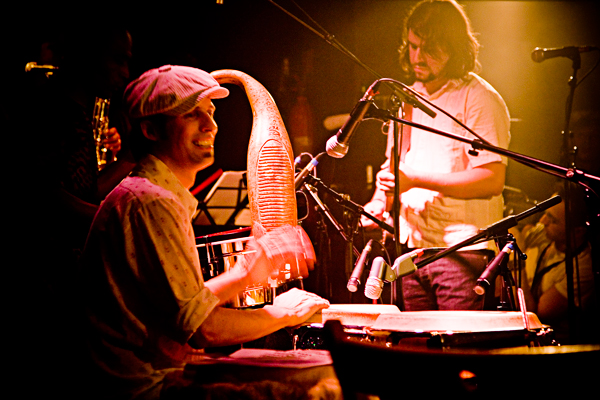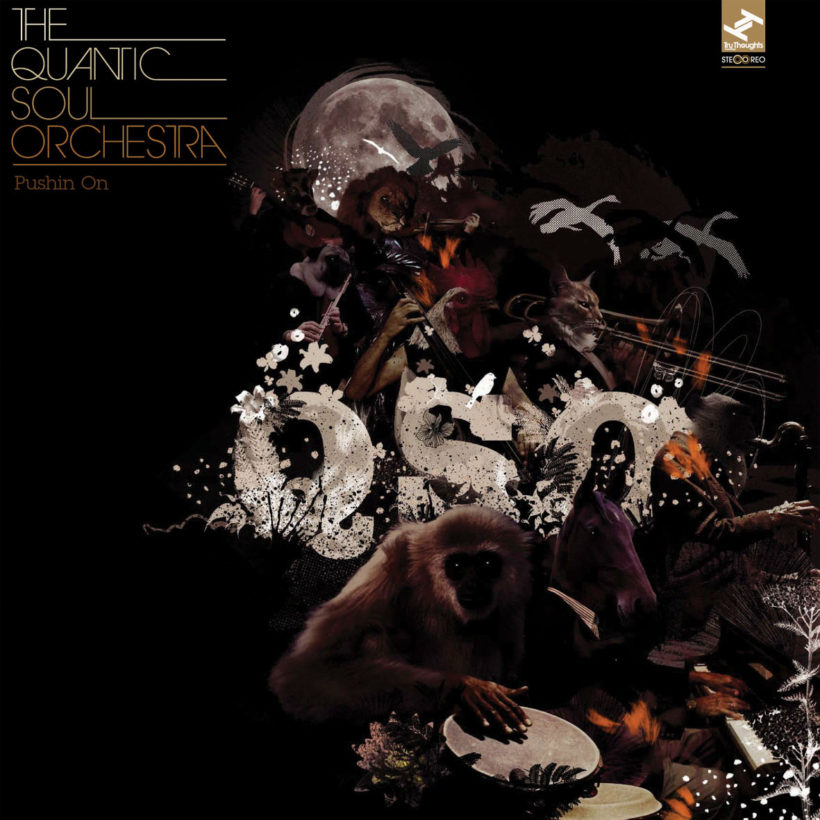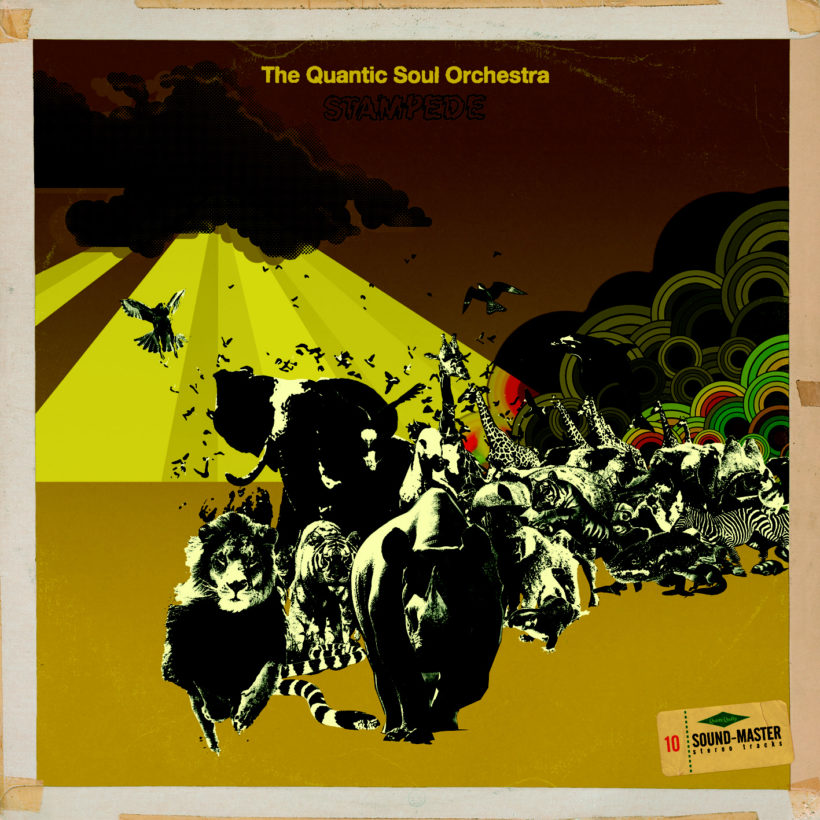
Quantic Soul Orchestra
Biography
While Will Holland records as Quantic for his more producer orientated music, The Quantic Soul Orchestra is a project that benefits from working with amazing musicians who can also deliver a phenomenal live performance. Over the years the QSO has involved a variety of members, collaborative partners and feature artists. The project was fired and founded in the studio originally with fewer than four members and Will’s sisters Lucy and Beth featured heavily, but Will Holland has always driven the project with his trademark sound, and since its first launch as a live, performing act on stage, the band has slowly added and gained members, as the sound and direction has changed.
Read more“Some of the best, most unique hip-hop we’ve heard all year. Essential!” – DJ Mag
“An accomplished celebration of all things Latin and funky” – Metro
“Grooves that cut to the bone” – XLR8R Magazine
The first time the QSO was heard was on the 7 inch “Super 8” back in May 2001. Will had already released his debut Quantic album “The 5th Exotic” and was getting great media and club attention. This was followed by the QSOalbum “Stampede” which featured the trademark deep, raw heavy funk of the QSO and included new music alongside inspired cover versions of 4Hero’s “Hold It Down” (featuring Alice Russell), Bonobo’s “Terrapin” and “Babarabatiri”. This album led to a 10.30pm Saturday night Main Stage gig at The Big Chill and various gigs across the UK and Europe.
The follow-up album Pushin’ On continued the growth of the act. This time around the music was definitely affected by the touring, performance and musicians – a perfect example of the live band, again with superb new music alongside a live classic in their cover version of Mr Scruff’s “Get A Move On”.
The Quantic Soul Orchestra recorded the album ‘I’m Thankful’ with the legendary soul singer Spanky Wilson and followed up with a collaborative tour with Spanky on lead vocal duties in late 2006, which saw a fantastic turnout from fans of both The QSO and Spanky Wilson.
In 2007, in search of the next development in his musical odyssey, we saw Will up sticks to Colombia to live, where he set about seeking out and recording with some of the older, authentic Latin American musicians who had so inspired him in his musical career to date. The fourth album ‘Tropidelico’ was recorded in Colombia and released in October 2007 to hugely positive reactions from the press and fans alike. The line-up for the Quantic Soul Orchestra’s triumphant UK and European tour in March 2008 featured some of the original artists who had contributed to the tropical, authentic heavy Latin and funk sounds on the ‘Tropidelico’ album. This tour, featuring Noelle Scaggs on lead vocals, and Peruvian pianist extraordinaire Alfredo Linares, was a stunning live experience.
Will Holland’s music has been supported by the likes of John Peel & Gilles Peterson through to the team on BBC’s Newsnight and broadsheets like The Independent, The Observer and The Guardian.
In the six years since the debut of the QSO Will’s worldwide travels have led him to some of the most talented musicians the world has to offer. Add to this his continual crate-digging (late night shouts to the window to ask record shops to open!) and you have an inspirational take on funk.
In Will Holland’s words…
Why did you form the QSO?
The QSO was formed to cater for the mounting interest in playing the forgotten origins of hip hop and sampling culture, the idea being to make modern day, good funk, soul, and more recently afrobeat and Latin American music, however in the style and ethic of the past. QSO continues to this day to draw on music of the past and, in Tropidelico, draws on Mambo, Cumbia and African influences.
What can people expect when they see the qso in any of its forms?
A good show, good musicianship, a little disorganisation (!), genuine spirit and a lot of fun.
The band has changed shape over the years, has this affected the project?
The QSO is not a super group or concept band; it is made up mostly of good honest people who have a talent but also a day job and their own life. People will always come in and out of the group, but is my job to make sure the sound stays constant. Every orchestra, group, string quartet etc. will change personnel over the years, but it is the name and brand of that orchestra that should stay constant and reliable.
You wrote and recorded an album with Spanky Wilson, how did this work alongside the QSO?
A sign of a good, efficient band is the ability to back people up suitably; with Spanky it was a great opportunity to work with a heroine of mine and make a show that she and I were really proud of. It is also a challenge to play with different people and try new things.
You have a progressive view of ‘funk’ music. Can you explain how this motivates the music you make?
The QSO has meandered through the foliage of music, mostly creating good, interesting danceable music along the way. Be it straight up funk re-works of modern classics – Sunshine Anderson’s ‘Heard It All Before’ and 4 Hero’s ‘Hold It Down’ – subtle and heavy instrumental workouts to entertain festival audiences on a dreary day, with soul-felt backing from the legendary singer ‘Spanky Wilson’ last year, QSO has always been about appealing to the heads and the masses.
Funk music and the music of Latin America, the Caribbean and Africa are all very closely linked, often spurring each other on to reach higher levels. The mixing of European and African rhythms and melodies has been a long time occupation for the human race. By this I mean, if you hear a mambo piano line played over a funk beat, they are not strangers; they are part of the same family. The melting pot of the USA and islands made sure of this. This mix of styles is by no means a revolutionary act, I’m sorry for any disappointment if people want to come and see a straight museum replica of a 60s funk band, there are plenty of bands that do a very good job of this. But at the moment, I’d rather mix it up a little, have an open mind, draw on the influences that make the UK such a musically rich home to have grown up in. A home I’m looking forward to returning to with a tight, heavy orchestra!
Who have you worked with on the album?
Many different players in Brighton (UK), San Juan (Puerto Rico), Panama City (Panama) and Cali (Colombia) including members of legendary Panama Soul Groups ‘The Soul Fantastics’ and ‘Los Fabulous Festivales’. From Peru, ‘Alfredo Linares’, a legendary piano player who has recorded since the 70s in Peru, Venezuela and Colombia, is upheld as a musical hero in Cali where his hit ‘Tijuanaco’ is still playing on the radio. Malcolm Catto (UK funk drummer, released records on Mowax) is also on this album, and J Live from New York.
How did you meet the Latin American musicians you worked with on the album?
I was introduced to the Panama musicians by Beto Gyemnant, the compiler of ‘Panama’ on Soundway records. He had spent many years researching and interviewing musicians and producers in Panama City and Colon. He is mainly interested in the 60s and 70s funk, soul and Latin scene in Panama. I went there on his advice and hooked up with a lot of the original musicians and the original studio and engineer. In Puerto Rico, I worked with the musicians introduced to me through working on projects for Candela Recordings including ‘Mi Swing Es Tropical’. Both horn players play for Roberto Roena, who is a legendary artist on Fania records. I got J Live on the album because he sent me a message on Myspace saying that he’d like to work with me on something. I sent him this salsa beat I had, thinking he wouldn’t go for it but he did, much to my satisfaction.
Where do you live in Colombia? And how do find the lifestyle change?
I live in Cali, Colombia. It is the third biggest City in Colombia and depends mostly on the Sugar Cane producing fields surrounding it and the drug dealing and money laundering inside of it. It is a terrific place for inspiration and even better for finding records and musicians. I moved my studio there in February and mixed and recorded most of the LP there. There has not been much lifestyle change, there are obviously key culture differences, but I am basically doing what I have always done but in a new country. In fact, it has made it a little easier to do as I can find great premises to house my studio and it is a little cheaper to live.
Does it change the way you write music?
Yes, definitely. I am certainly more relaxed and thoughtful with my work in Cali but that might be because I haven’t taken that many DJ gigs of late, which has left me with more time to concentrate on writing music and producing. I’ve also had time to check a lot of interesting local bands, Curralao, Cumbia, Fandango…all these styles are getting me thinking about music.
Photography by Adam Van Bunnens – www.Bunnens.com



